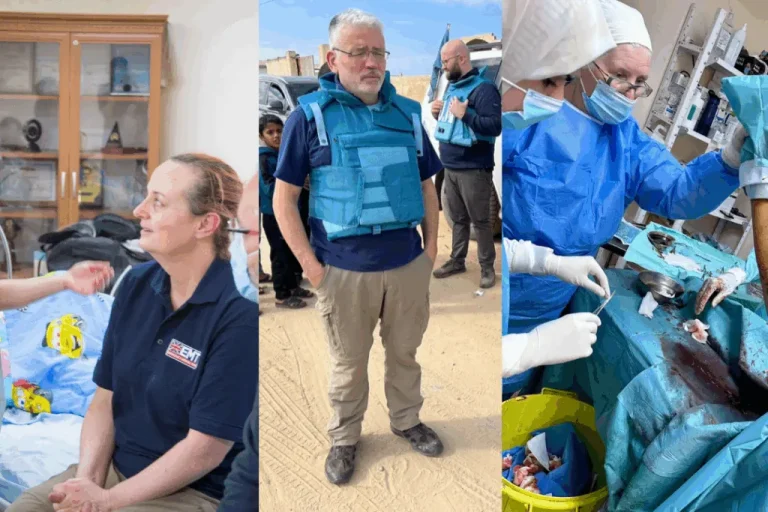Ever since the founding of the profession during the time of Florence Nightingale and Mary Seacole, nurses have travelled to areas of war and disaster to answer pleas for help from those who need it most.
In a destabilising world beset by modern conflicts in which civilians are frequently counted among the casualties – as well as disease and the impact of climate change – this tradition of the humanitarian nurse is, arguably, needed now more than ever.
In the Middle East, most prominently in the Gaza Strip, health systems have been left on their knees by the impact of war.
Meanwhile in Europe, attacks on medical facilities and other infrastructure in Ukraine, exacerbated by a large number of healthcare workers fleeing the country, have significantly damaged that country’s capacity to cope with basic primary care needs.
Nursing Times has spoken with three nurses embodying what it means to be a global nurse; they have travelled to some of the most dangerous places on Earth to help support struggling healthcare systems, sometimes at great risk to their own lives.
Chris Hunter
Lincolnshire theatre nurse Chris Hunter has nursed patients in more than half a dozen countries overseas in her more than five decades-long career so far. Ms Hunter, who has also previously worked as a registered midwife, first worked overseas in 1996, on a midwifery training project in Pakistan with St John Ambulance.
She later joined the Queen Alexandra’s Royal Army Nursing Corps, which led her to assignments in Bosnia, Kosovo, Iraq and Afghanistan. Ms Hunter told Nursing Times she was drawn by the “adventure and challenge” of working in conflict and other humanitarian disaster zones.
In January 2024, she embarked on the first of two trips to Gaza with UK-Med, which coordinates healthcare workers to help in warzones and humanitarian disaster areas.
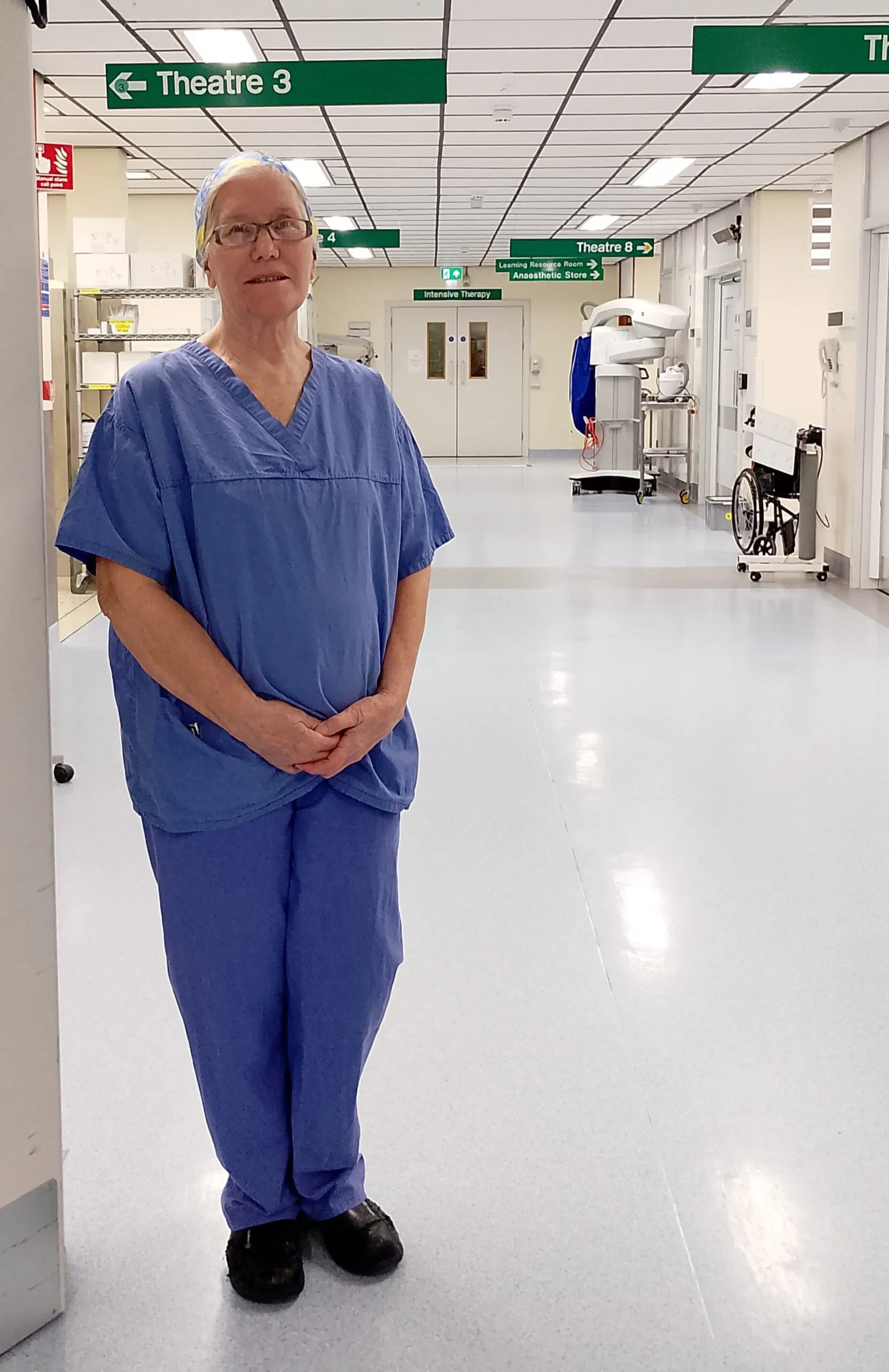
Chris Hunter
Funded by – but independent of – the UK’s Foreign, Commonwealth and Development Office (FCDO), UK-Med has a roster of aid workers, including doctors and nurses, who are ‘on-call’ to be assigned overseas.
Many of them are full-time NHS employees and, in such instances, UK-Med backfills the health service for the duration of their time away.
Based at Al-Aqsa Hospital, in the Deir al-Balah area of Gaza, Ms Hunter worked alongside a multidisciplinary team featuring nurses, anaesthetists and others.
The team provided much-needed extra hands for treating those injured in attacks by the Israel Defense Forces (IDF).
Gaza
On 7 October 2023, a decades-long conflict flared back up when Hamas, the Palestinian group that controls the Gaza Strip, attacked a group of Israeli communities, leaving more than 1,000 dead, including civilians.
The Israel Defense Forces (IDF), Israel’s military, launched airstrikes and invaded Gaza with ground forces in response. This has, to date, left more than 60,000 dead, many of whom were civilians, and more than 100,000 people injured. According to the World Health Organization, attacks by Israel devastated Gaza’s infrastructure, with fewer than half of the region’s 36 hospitals remaining even partially operational.
Among the dead and injured have been aid workers, nurses and doctors, prompting calls from international observers for both sides to adhere to international law and cease attacks on healthcare settings. An Israeli aid blockade, condemned by international observers, has also made it difficult to bring supplies into Gaza. Amnesty International, at the start of July, said there was evidence that Israeli forces were using starvation to “inflict genocide against Palestinians”, which the Israeli government has consistently denied.
Ms Hunter had seen news articles and footage from Gaza before travelling there, but what she saw was beyond expectations, she said. “There were hundreds of people living in tents… no proper sewerage facilities, no washing facilities, no clean water,” she said.
Treating around 20 patients a day, Ms Hunter saw people being carried into the hospital by relatives on pallets or small broken beds.
“It was like a conveyor belt, really. No sooner had you done one dressing, then it was time to do another… [we were] dressing [people with] amputated limbs, gunshot wounds, blast wounds and burns; children and adults, and all sorts of other patients.”
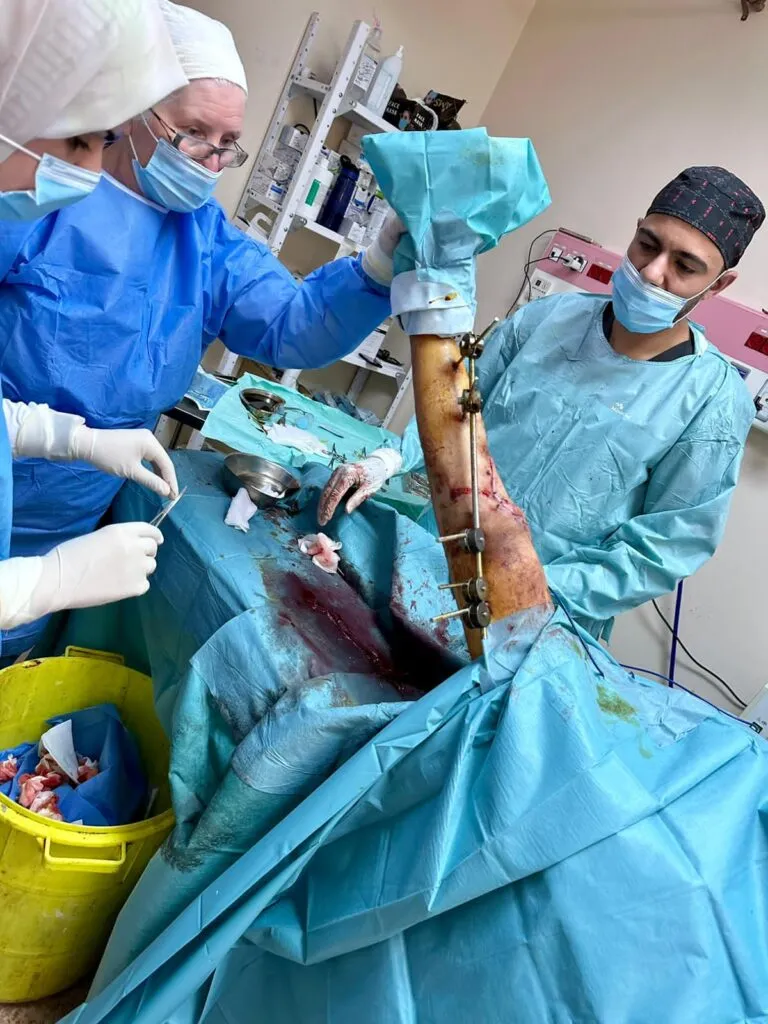
Chris Hunter working at a field hospital in Gaza
Ms Hunter stayed at a safe house a short drive from the hospital. Even the process of getting to and from the medical facility was fraught, she said.
“We had to go in cars that were labelled and were identifiable… we couldn’t move until we’d got the OK from [the IDF]. We couldn’t deviate from the route that they told us we could go on and we had to be back by a certain time as well.”
Access to clean water, Ms Hunter said, was a constant struggle. She recalled one instance, during her second stint in Gaza at a field hospital near Deir al-Balah – one of two funded by the FCDO – where sterile water used to irrigate wounds had all but run out.
Ms Hunter’s team had to negotiate access to water supplies after it had been treated by ultraviolet light, but before chlorination, to avoid completely running out.
“When you’re in Gaza, you’ve got to think sideways, and you’ve got to think on your feet all the time, and try and adapt things. It is difficult, but it’s enjoyable. I like these tests, where it pushes you further… necessity is the mother of invention.”
Earlier this year, Ms Hunter was called up by UK-Med to travel to Ukraine.
Based in Zaporizhzhia in the south east of the country, she said Ukraine was a dangerous place and its health system was struggling to meet demand. Her role was mainly to provide relief to the system and catch up on a backlog of non-emergency care – though she also helped administer trauma care when Russian attacks took place.
Ukraine
Since 24 February 2022, Ukraine has been under attack by Russian military forces. A huge number of civilians and soldiers have been killed in this conflict, but estimates vary wildly due to difficulties with data reporting in the region. The Kyiv Independent, an English-language Ukrainian news organisation, claimed that, as of 12 June 2025, the “minimum estimate” for the death toll on both sides stood at roughly 170,000.
Healthcare and aid workers, including nurses, have been counted among the dead. According to a World Health Organization figures published in February 2025, there had been 2,254 attacks on healthcare workers and facilities since the start of the invasion. Repeated attempts to negotiate a ceasefire between Russia and Ukraine have been unsuccessful.
Asked if she would continue this work overseas, Ms Hunter, who is now in her 70s, believes she can still have a positive impact.
“I’d like to go back out to Gaza, because I’ve got a lot of friends there, a lot of Palestinians [who] I am in contact with and they really are suffering,” she said, adding: “I’ve still got a lot that I can give.”
“If anybody’s interested in doing this sort of thing, then look at what’s going on [but] it’s not a light decision that you take, obviously, because it’s full of danger,” she noted.
She added that her family, including her grandchildren, worry about her but they have long stopped trying to dissuade her from continuing such dangerous work. “They just accept it,” Ms Hunter said. “They know that once I’ve got my mind set on something, that obviously I want to do it.”
David Anderson
Registered nurse and UK-Med’s senior health advisor for disaster and conflict responses, David Anderson, was part of the organisation’s first push to provide aid to Gaza shortly after the conflict resumed in 2023.
He described the region as the “most complicated, difficult and violent place” that he had ever been – but that assisting local nurses to provide much-needed assistance was a “pleasure”.
Mr Anderson, a former NHS nurse director, played a key role in negotiating entry for healthcare staff into Gaza via the Rafah crossing with the IDF and Hamas in December 2023. This process, he said, took around a month.
“I’ve had the unfortunate pleasure of negotiating with more than one terrorist group in my career,” said the experienced humanitarian nurse.
“What you’ve got to be able to do is make sure you maintain your neutrality… I don’t care who the patient is, a patient’s a patient.
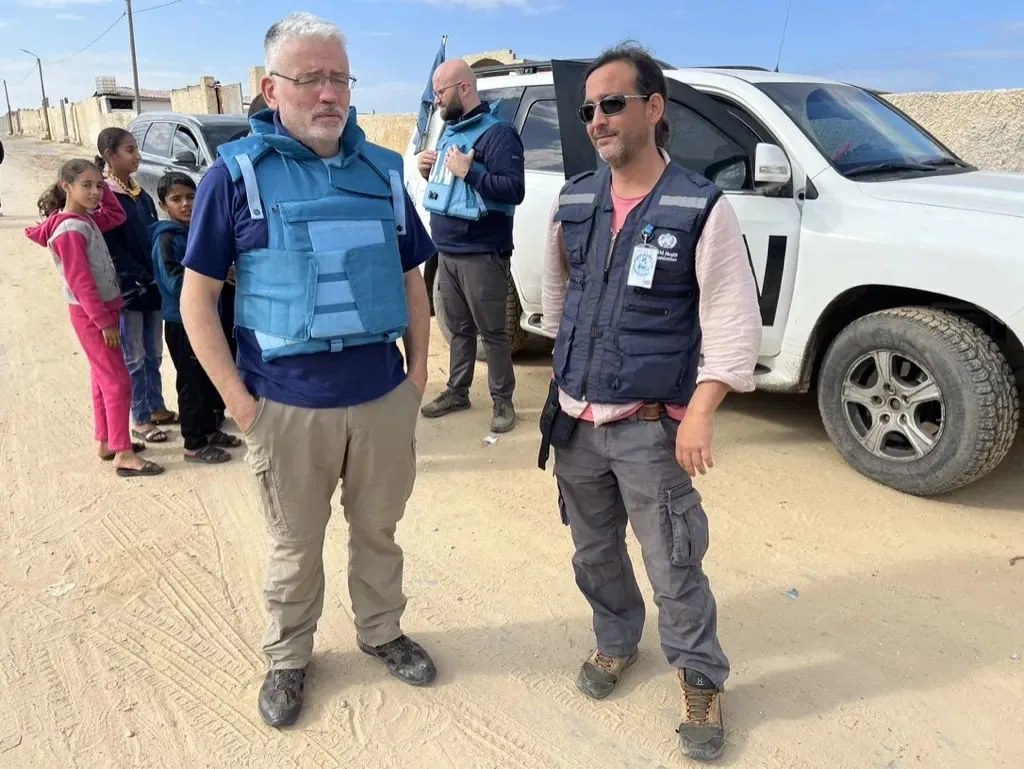
David Anderson in Gaza for UK-Med
“So [we had] to get the permissions from the IDF [and] Hamas… there was a lot of checking that goes on, because there’s a lot of fear that people may be linked to other organisations, which we are clearly not.
“It takes significant negotiation with all parties to be able to get the permission to go in. And even then, there are risks; you’re travelling through active war zones.”
Mr Anderson’s team subsequently entered Gaza, where they later set up a FCDO-funded field hospital near Al-Mawasi, a coastal area in the south west of the territory. The situation was dire: “We were doing a lot of trauma care.
“At that point, we only had one theatre and around 40 beds… at times we’d be down to one or two units of blood, sometimes the only painkiller was paracetamol.”
Mr Anderson recalled the “erratic” nature of supplies to the region. Ketamine was the only anaesthetic drug available in one instance, while water and food shortages posed further challenges to patients’ treatment and recovery.
Describing the situation there, he said: “Sometimes you’d get 70 critically injured patients within 40 minutes to an hour, that you’ve got to deal with.
“People who have been shot by 40mm bullets or were injured by explosions… fairly severe injuries.”
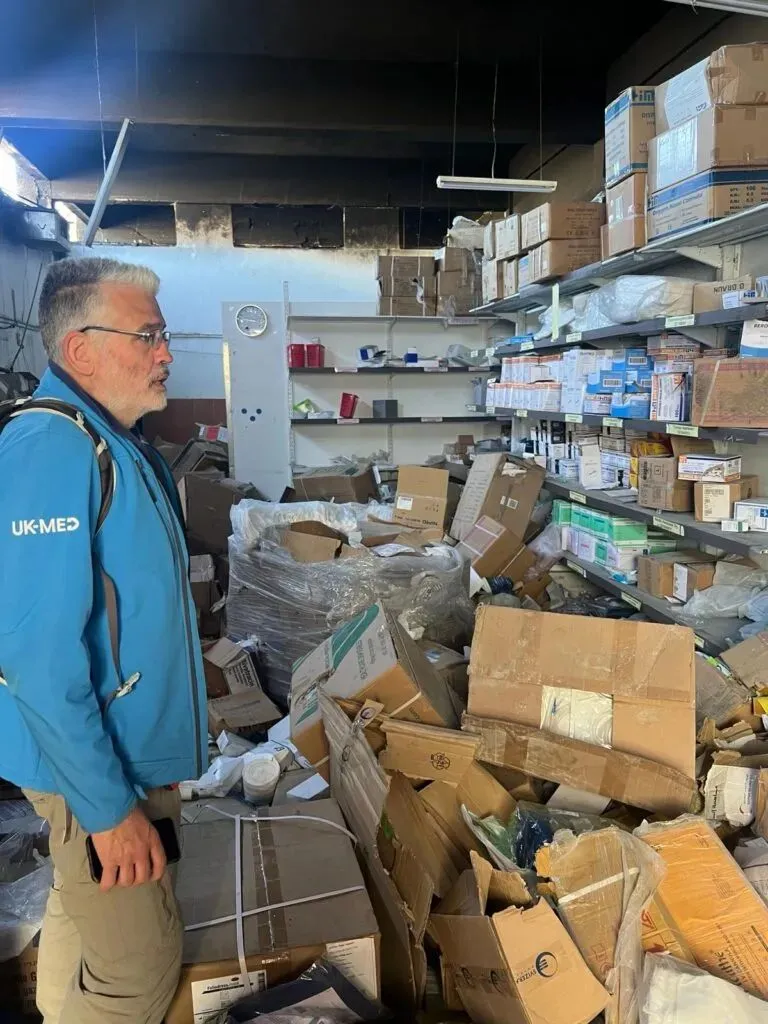
David Anderson surverying the damage at Nasser Hospital, March 2024
Despite international law forbidding deliberate attacks on healthcare facilities, aid workers, nurses and others have, unfortunately, been among those hurt or killed by Israeli strikes in Gaza.
Mr Anderson explained the measures he took to keep his team safe: “There’s a process called deconfliction, which means that you tell all [parties] where you are, and they acknowledge you are there, what you are doing and, in theory, you should not get assaulted or attacked.
“I was managing multiple sites, seven at one point. I had to move between them all and make sure the quality is as good as it can be, that they’ve got other drugs and everything else.
“And [I] had to get permission [from the militaries] for all those movements… if you do something against procedures, whatever side of the conflict that is, you are at risk of becoming a legitimate target.”
Royal honours
Chris Hunter and David Anderson have both received royal recognition for their work overseas. Earlier this year, Ms Hunter became one of the first recipients of the government’s new Humanitarian Medal, for those involved in providing aid and support to human welfare during or in the aftermath of a humanitarian crisis. Meanwhile, Mr Anderson was named in the 2025 New Year Honours as an Officer of the Order of the British Empire (OBE).
The pair, alongside other nurses deployed by UK-Med, were recognised for their role in establishing the two Foreign, Commonwealth and Development Office-funded emergency field hospitals in Gaza, which have to date treated more than 300,000 patients. Speaking after Ms Hunter received her award, foreign secretary David Lammy said: “This new medal recognises the incredible dedication and selfless service of individuals on the front line of the UK’s responses to some of the world’s most devastating crises. I am delighted the first tranche of awards will recognise members of the UK government’s emergency deployment teams, for their brave work in Libya, Morocco and Gaza.”
In addition to his more recent work in warzones, Mr Anderson has completed deployments with UK-Med in areas experiencing serious disease outbreaks.
His first expedition, to Sierra Leone in 2014, was with UK-Med and the International Medical Corps (IMC). There, he supported a healthcare system overwhelmed by the Ebola virus.
When his team arrived in the West African country, the fatality rate of patients with the disease stood at a staggering 96%.
“Patients didn’t really have much of a chance,” he said. “Happily, that began to fall, and we ended up with about a case fatality rate of around 60% which is still terrible, but it was significantly better than when started,” he noted.
Mr Anderson said the impact of Ebola on the country was “horrific”. “A lot of [the cases were] children,” he said. “It becomes quite difficult to manage that and help support some people.”
This type of work, Mr Anderson acknowledged, was not for everyone.
He said while he had never personally experienced post-traumatic stress disorder, or other mental health conditions resulting from field work, it was “a very real thing” for some people.
Despite this, he would “absolutely” recommend it to those who believe they can handle the extreme environment.
Trish McCready
Intensive care nurse Trish McCready, who also serves as the finance director of the British Association of Critical Care Nurses, has worked in areas of need across the world, primarily providing training.
Her first experience nursing overseas was a 2020 deployment to Armenia as a training, support and clinical educator with the FCDO-funded UK Emergency Medical Team (UK-EMT). Based in the capital city, Yerevan, she helped support and train local clinicians at a 50-bed-strong intensive care unit.
Ms McCready highlighted the eagerness of the local nurses to learn in any setting. “They were brilliant,” she said. “It doesn’t matter where you go and how awful the situation can be – and I’m sure Gaza is absolutely dreadful – nurses are so enthusiastic, and they love training.”
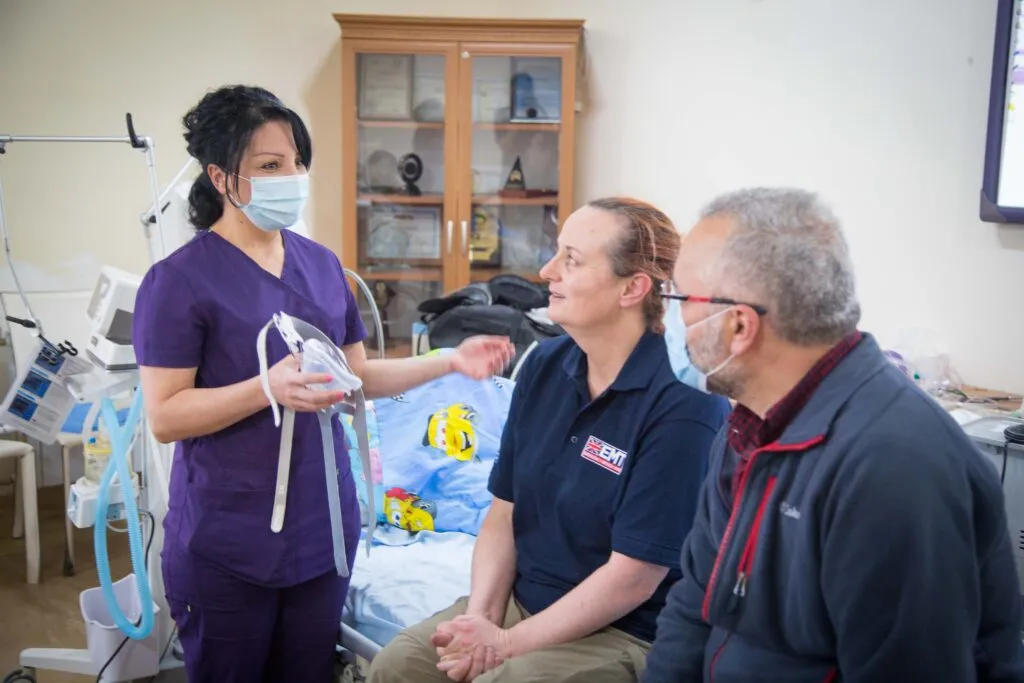
Trish McCready in Armenia for UK EMT
She has also been deployed to Ukraine multiple times. During one of her visits to the country, in 2022, she worked with a family doctor to visit patients in areas formerly occupied by Russian forces. During further deployments in 2023 and 2024, Ms McCready was based in the cities of Odesa and Kharkiv.
There, she was in teams helping to improve the training of nurses and other healthcare staff as part of a collaboration between the IMC and the Harvard Humanitarian Initiative.
Earlier this year, Ms McCready travelled to Saida, in Lebanon, with UK-EMT, to support intensive care nurses, help purchase equipment and set up an intensive care unit. “We had a budget to buy a certain amount of kit, which is not as straightforward as you may think, because… a lot of the kit you have to get imported.
“It has to go through Beirut docks, and then we have to get it delivered.”
Asked if she would recommend the work to other nurses, Ms McCready said: “Yes, absolutely, yes.
“It’s nice to try to look at the nursing profession as a global [one]. We should be supporting each other when we’re working our own units in our own regions and countries, [but] I think it’s important that we all try and do that globally.” She added: “We should try to look at nursing as a global [profession], and we should be trying to support other nurses when they’re… under duress.”

